I was honored to represent the Americas at the Havana, Cuba, international 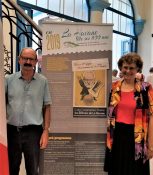 colloquium: Victor Hugo, Visionary of Peace. This colloquium—which brought together for the first time Hugo experts invited from the five corners of the world—was the brainchild of French scholar Gérard Pouchain. Sponsored by the Association Cuba Coopération France and scheduled to coincide with the 500th anniversary of the founding of Havana, the Colloquium took place in the charming cultural center Casa Victor Hugo on Calle O’Reilly in Old Havana on November 13-14, 2019. The sessions were organized by co-presidents Florence Naugrette and Jean-Marc Hovasse, both Sorbonne University professors renowned for their work on Victor Hugo.
colloquium: Victor Hugo, Visionary of Peace. This colloquium—which brought together for the first time Hugo experts invited from the five corners of the world—was the brainchild of French scholar Gérard Pouchain. Sponsored by the Association Cuba Coopération France and scheduled to coincide with the 500th anniversary of the founding of Havana, the Colloquium took place in the charming cultural center Casa Victor Hugo on Calle O’Reilly in Old Havana on November 13-14, 2019. The sessions were organized by co-presidents Florence Naugrette and Jean-Marc Hovasse, both Sorbonne University professors renowned for their work on Victor Hugo.
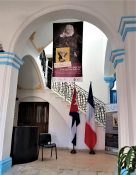 Why go to Havana in order to explore Victor Hugo’s engagement with peace? Because Hugo is still recognized there for having supported Cubans’ independence from Spain. In 1870, from his Hauteville House exile home on Guernsey, Hugo wrote encouraging letters, memorably saying, “Cuba belongs only to Cuba.” Here’s how the colloquium organizers explain it:
Why go to Havana in order to explore Victor Hugo’s engagement with peace? Because Hugo is still recognized there for having supported Cubans’ independence from Spain. In 1870, from his Hauteville House exile home on Guernsey, Hugo wrote encouraging letters, memorably saying, “Cuba belongs only to Cuba.” Here’s how the colloquium organizers explain it:
“This great French writer belongs to the world’s conscience. His humanism in support of all those who suffer and those who fight for better lives led him to defend the Cuban people’s battle for independence. His letters of support in 1870 to Cuban women refugees who sought his aid from New York and to the Cuban fighters remain in Cubans’ memories. Hugo is the ‘Frenchman par excellence,’ just as José Marti (the Cuban patriot and independence fighter who visited Hugo in Paris) is the ‘Cuban par excellence.’”
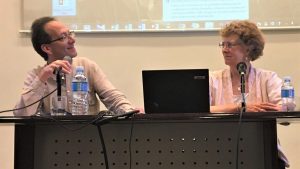 The eleven specialists—who came from France, Tunisia, Australia, China, and the United States—treated many aspects of Hugo’s life and work with respect to peace: from Hugo’s election as the president of the 1849 World Peace Congress in Paris, to his defense of the Chinese people, to an analysis of nineteenth-century Australians’ perceptions of Hugo, to Hugo as portrayed in caricature and photos during his various engagements with peace. Speakers also studied Hugo’s visions of peace in such important poetry
The eleven specialists—who came from France, Tunisia, Australia, China, and the United States—treated many aspects of Hugo’s life and work with respect to peace: from Hugo’s election as the president of the 1849 World Peace Congress in Paris, to his defense of the Chinese people, to an analysis of nineteenth-century Australians’ perceptions of Hugo, to Hugo as portrayed in caricature and photos during his various engagements with peace. Speakers also studied Hugo’s visions of peace in such important poetry 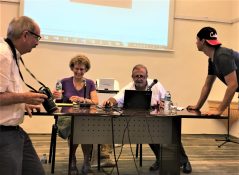 collections as La Légende des Siècles, Les Châtiments, and La Fin de Satan. I focused on his epic Les Misérables, exploring the role of Jean Valjean with respect to multiple facets of peace in my talk, “Jean Valjean, Emissary of Peace Who Seeks Peace.” Click here for the abstract in English or in French.
collections as La Légende des Siècles, Les Châtiments, and La Fin de Satan. I focused on his epic Les Misérables, exploring the role of Jean Valjean with respect to multiple facets of peace in my talk, “Jean Valjean, Emissary of Peace Who Seeks Peace.” Click here for the abstract in English or in French.
All of us who participated greatly appreciated the warm welcome from the Casa 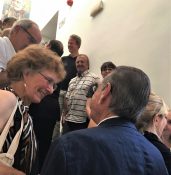 Victor Hugo staff, as well as from the Havana Alliance Française. Numerous French representatives traveled from France for the colloquium, including Victor Hugo’s great-great granddaughter Jeanne and her husband. The Casa Victor Hugo and Colloquium participants also enjoyed a visit from former French present François Hollande, who was in Havana for the 500th-anniversary celebration.
Victor Hugo staff, as well as from the Havana Alliance Française. Numerous French representatives traveled from France for the colloquium, including Victor Hugo’s great-great granddaughter Jeanne and her husband. The Casa Victor Hugo and Colloquium participants also enjoyed a visit from former French present François Hollande, who was in Havana for the 500th-anniversary celebration.
Click here for the Program in English / Program in French.
Photo credits for the last three photos: Jean-Marc and Annie Gomis. Mille mercis!
